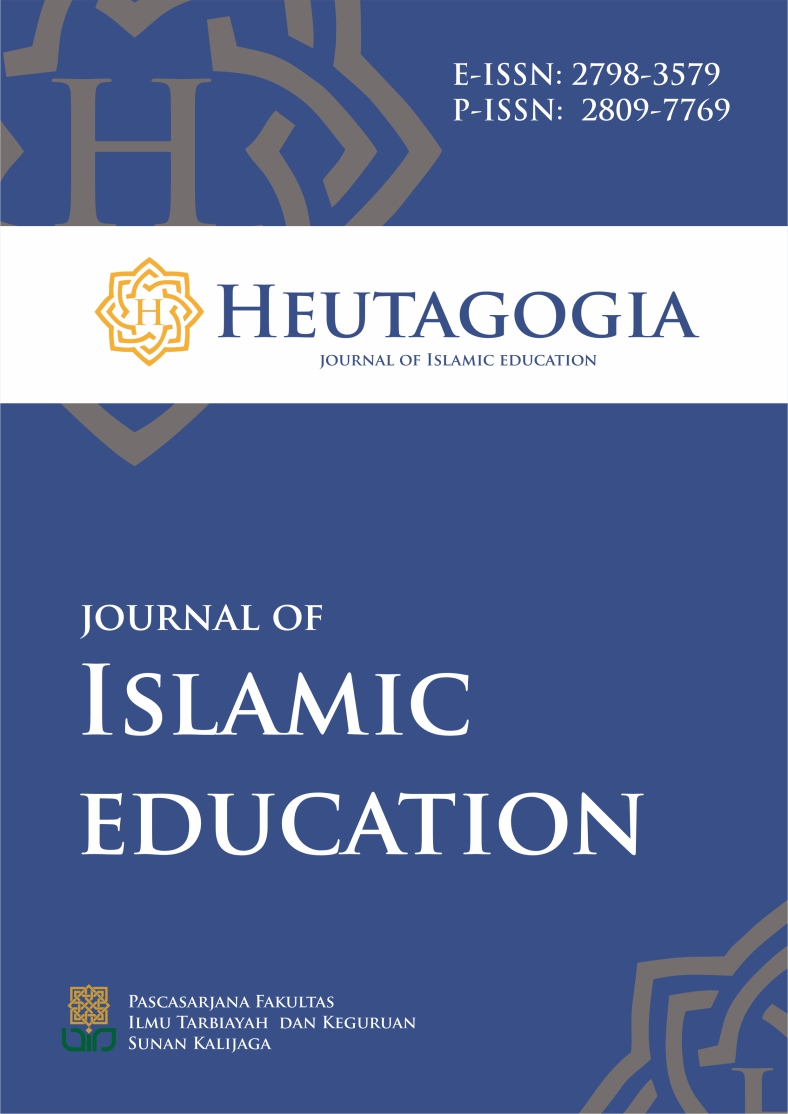Foundations and Contemporary Relevance of Salafi Islamic Education in Indonesia: Principles, Curriculum, and Moral Development
DOI:
https://doi.org/10.14421/hjie.2024.42-10Keywords:
Salafi Education, Islamic Curriculum, Moral DevelopmentAbstract
This study analyzes the foundational principles, curriculum structure, and contemporary contributions of Salafi Islamic educational institutions in Indonesia, focusing on their adherence to the manhaj salaf methodology. Employing a qualitative conceptual analysis through a structured literature review of 34 scholarly sources from 2010 to 2024, it explores the theological underpinnings, pedagogical approaches, and institutional responses to modernity. Salafi education prioritizes the purification of Islamic teachings, emphasizing tawḥīd, memorization of the Qur’an and ḥadīth, and traditional instructional methods such as halaqah and talaqqī. Secular knowledge integration remains minimal and strategic, preserving doctrinal orthodoxy. The institutions contribute significantly to moral and character development by fostering ethical discipline grounded in prophetic teachings. While cautious, selective adaptations to globalization and technological advances are evident, ensuring educational relevance without compromising core values. Limitations include reliance on textual analysis without empirical fieldwork, prompting recommendations for future research on practical implementations and comparative pedagogical models. The study underscores Salafi education’s vital role in maintaining Islamic orthodoxy and moral integrity within Indonesia’s pluralistic context, advocating for ongoing epistemological dialogue to balance doctrinal fidelity and educational openness.
Downloads
References
Aidulsyah, F. “The rise of urban Salafism in Indonesia: The social-media and pop culture of new Indonesian Islamic youth.” Asian Journal of Social Science 51, no. 4 (2023): 252–59. doi:https://doi.org/10.1016/j.ajss.2023.07.003.
Ajhuri, Kayyis Fithri. “Prophetic Literacy Education: An Integrative Model of Spirituality, Intellectuality, and Social Action.” HEUTAGOGIA: Journal of Islamic Education 4, no. 2 SE-Articles (Desember 2024): 163–74. doi:10.14421/hjie.2024.42-02.
Alam, Md Kausar, dan Muhammad Shahin Miah. “Do Islamic banks use institutional theory in the light of Shariah governance? Empirical evidence from a Muslim dominant country.” Heliyon 10, no. 2 (2024): e24252. doi:10.1016/j.heliyon.2024.e24252.
Bruinessen, Martin van. “Salafism and the State: Islamic Activism and National Identity in Contemporary Indonesia, by Chris Chaplin.” Bijdragen Tot de Taal-, Land- En Volkenkunde / Journal of the Humanities and Social Sciences of Southeast Asia 178, no. 2–3 (2022): 338–41. doi:10.1163/22134379-17802004.
Duderija, Adis. “Constructing the religious Self and the Other: neo-traditional Salafi manhaj .” Islam and Christian–Muslim Relations 21, no. 1 (1 Januari 2010): 75–93. doi:10.1080/09596410903481879.
Erwandi, Rudi, Ahmad Gawdy Prananosa, M Rusni Eka Putra, Armi Yuneti, dan Donni Pestalozi. “Salafi-Based Integrated Islamic Elementary School Management.” Tafkir: Interdisciplinary Journal of Islamic Education 4, no. 3 (16 September 2023): 502–18. doi:10.31538/tijie.v4i3.598.
Handsman, Emily. “From Virtue to Grit: Changes in Character Education Narratives in the U.S. from 1985 to 2016.” Qualitative Sociology 44, no. 2 (2021): 271–91. doi:10.1007/s11133-021-09475-2.
Hasbialloh, Hasbialloh. “Existence of Salafi Education Institutions in West Nusa Tenggara: Study on Resistance and Conflict of Beliefs and Student’s Parents Motivation in Selecting the Salafi Educational Institutions” 8, no. 10 (2021): 341. doi:10.18415/ijmmu.v8i10.3060.
Hatim Gazali, Dewi Anggraeni, dan Mariam Eit Ahmed. “Salafi-Jihadist Movements and Ideology in Educational Institutions: Exploring the Nexus with Religious Moderation.” Edukasia Islamika 8, no. 1 (28 Juni 2023): 127–46. doi:10.28918/jei.v8i1.365.
Hidayat, Wahyu, dan Nur Hidayat. “Islamic Boarding School Management: A Comprehensive Analysis of a Special Program for Fostering Students’ Disciplinary Character in Madrasah Ibtidaiyah.” HEUTAGOGIA: Journal of Islamic Education 3, no. 2 (31 Desember 2023): 225–36. doi:10.14421/hjie.2023.32-07.
Iqbal, Asep Muhamad, dan Z. Zulkifli. “New Media Technology and Religious Fundamentalist Movements: Exploring the Internet Use by Salafi Movement in Indonesia.” In Proceedings of the 1st International Conference on Recent Innovations (ICRI), 1566–73, 2018. doi:10.5220/0009932115661573.
Irham, Irham. “Pesantren Manhaj Salafi: Pendidikan Islam Model Baru Di Indonesia.” ULUL ALBAB: Jurnal Studi Islam 17, no. 1 (2016): 1–18. doi:10.18860/ua.v17i1.3252.
Iskandar, I. “Manhaj Salafi and its Controversial Da’wah in Youtube Vlogs.” International Journal of Nusantara Islam 9, no. 2 (2021): 573–90. doi:10.15575/ijni.v9i2.16870.
Jamhari, dan Saifudin Asrori. “The Making of Salafi-Based Islamic Schools in Indonesia.” Al-Jami’ah: Journal of Islamic Studies 60, no. 1 (2022): 227–64. doi:10.14421/ajis.2022.601.227-264.
Lestari, Wahidah Iskar, Rena Latifa, dan Muthia Rahmah. “Academic Cheating in Pesantren: How Self Efficacy, Religiosity, and Academic Integrity Predict Academic Cheating.” TARBIYA: Journal of Education in Muslim Society 9, no. 1 (2022): 1–18. doi:10.15408/tjems.v9i1.24701.
Maksum, Ali. “Model Pendidikan Toleransi di Pesantren Modern dan Salaf.” Jurnal Pendidikan Agama Islam (Journal of Islamic Education Studies) 3, no. 1 (2016): 81–108. doi:10.15642/jpai.2015.3.1.81-108.
Meliani, Fitri, Hasan Basri, dan Andewi Suhartini. “Learning System in Salafi Manhaj Boarding School.” Munaddhomah: Jurnal Manajemen Pendidikan Islam 4, no. 2 (2023): 175–86. doi:10.31538/munaddhomah.v4i2.300.
Mir, Khalid Hussain. “The Resurgence of Islamic Thought: The Reformist Approach of Maulana Wahiduddin Khan.” AL-AFKAR: Journal for Islamic Studies 6, no. 2 (2023): 11–24. doi:10.31943/Afkarjournal.V6i2.475.
Mirshahvalad, Minoo. “Islamic reform with or without Ulama? A comparative study between al-Kawakibi and Naini.” British Journal of Middle Eastern Studies, 2024, 1–16. doi:10.1080/13530194.2024.2373986.
Muhammad-Busayri, Sulyman. “a Comparative Study of Manhaj Salafi Cum At-Taṣawwuf Al-Islāmiy on Radio: a Clarion Call for Muslim Brotherhood.” Ilorin Journal of Religious Studies 11, no. 2 (2021): 67–84.
Muthohirin, Nafik. “Salafi Madrasas: Ideology , Transformation , and Implication for Multiculturalism in Indonesia.” Fikrah: Jurnal Ilmu Aqidah dan Studi Keagamaan 10, no. 1 (2022): 81–100. doi:10.21043/fikrah.v8i1.14380.
Muzawir Munawarsyah. “Islamic Education in the Modern Era: Analysis of Student Character and Their Role in Facing the Challenges of Industry 4.0.” HEUTAGOGIA: Journal of Islamic Education 3, no. 2 SE-Articles (Desember 2023): 141–54. doi:10.14421/hjie.2023.32-01.
Nasri, Ulyan, dan Arif Mulyohadi. “Salafi Islamic Education: Teaching Methods, Traditions and Ideologies in Lombok Boarding Schools.” SYAIKHUNA: Jurnal Pendidikan dan Pranata Islam 14, no. 2 (2023): 216–33. doi:10.58223/syaikhuna.v14i02.7029.
Nasution, Ismail, dan Ridwan Hasbi. “Hadis ‘Khair Al-Qurun’ Dan Perubahan Sosial Dalam Dinamika Hukum.” Jurnal Ushuluddin 26, no. 1 (2022): 69. doi:10.24014/jush.v26i1.4042.
Rahman, Mulia, dan Syahminan. “The existence of Dayah Salafiyah in the Development of Islamic Education in the era of globalization.” Tafkir: Interdisciplinary Journal of Islamic Education 5, no. 3 (2024): 462–77. doi:10.31538/tijie.v5i3.1151.
Saada, Najwan. “Educating for global citizenship in religious education: Islamic perspective.” International Journal of Educational Development 103 (2023): 102894. doi:https://doi.org/10.1016/j.ijedudev.2023.102894.
———. “The Theology of Islamic Education from Salafi and Liberal Perspectives.” Religious Education 113, no. 4 (8 Agustus 2018): 406–18. doi:10.1080/00344087.2018.1450607.
Sriyanto, Agus. “Methods for Memorizing Tahfidz Qur’an in Children and the Search for Identity (Study in the Salafi Community of Ngawi Regency).” AL-MUADDIB: Jurnal Kajian Ilmu Kependidikan 6, no. 4 (2024): 1012–26. doi:10.46773/muaddib.v6i4.1517.
Suyadi, Zalik Nuryana, Sutrisno, dan Baidi. “Academic reform and sustainability of Islamic higher education in Indonesia.” International Journal of Educational Development 89 (2022): 102534. doi:https://doi.org/10.1016/j.ijedudev.2021.102534.
Syihabudin, Tubagus, B Syafuri, dan Anis Fauzi. “The Leadership Planning and Education Quality of Salafi Islamic Boarding Schools.” Tadbir: Jurnal Studi Manajemen Pendidikan 7, no. 2 (20 September 2023): 477–94. doi:10.29240/jsmp.v7i2.7552.
Wahid, Din. “Nurturing Salafi manhaj: A study of Salafi pesantrens in contemporary Indonesia PhD Thesis Summary A study of Salafi pesantren in contemporary Indonesia.” Wacana: Journal of the Humanities of Indonesia 15, no. 2 (2014): 367–76. doi:10.17510/wacana.v15i2.413.
Wahyudin, Wahyudin. “Pendidikan Muslimah Bercadar di Pesantren Bermanhaj Salafi di Kota Metro.” Tarbawiyah: Jurnal Ilmiah Pendidikan 2, no. 2 (2018): 323–46. doi:10.1080/10576100500497004.
Zuhri, Safudin, dan Atikah Syamsia. “Integration of Salafi Islamic Boarding School Education With Modern School Curriculum.” TARBIYA: Journal of Education in Muslim Society 9, no. 1 (2022): 35–50. doi:10.15408/tjems.v10i1.25577.
Downloads
Published
How to Cite
Issue
Section
License

This work is licensed under a Creative Commons Attribution-NonCommercial 4.0 International License.















